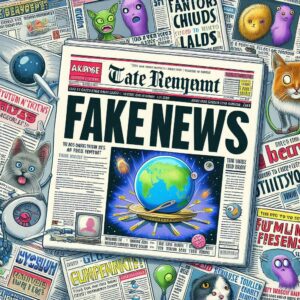フェイクニュースとは?
フェイクニュース(偽ニュース)とは、事実に基づかない虚偽の情報を意図的に作り出し、真実であるかのように広めるニュースや報道を指します。インターネットやソーシャルメディアの普及により、情報が瞬時に拡散される現代では、フェイクニュースが社会に大きな影響を与えるケースが増えています。
フェイクニュースの特徴
フェイクニュースには以下のような特徴があります。
虚偽の情報
根拠のない噂やデマを、事実であるかのように伝えるニュースです。これらの情報は、信頼できるニュース源から提供されているように見えることが多いですが、実際には事実に基づいていません。
意図的な誤解を招く報道
情報を部分的に切り取ったり、捏造したりして、人々を誤解させる意図で作られることが多いです。特に、感情を刺激する内容やショッキングなニュースは、拡散されやすく、多くの人々の関心を引きます。
匿名性とソーシャルメディアの力
ソーシャルメディアやブログ、匿名掲示板などのプラットフォームでは、個人が簡単に情報を発信できるため、フェイクニュースが広まりやすいです。また、これらのプラットフォームでは拡散のスピードが非常に速く、短期間で多くの人に影響を与えることができます。
フェイクニュースが広がる理由
フェイクニュースが急速に広がる理由には、次の要因があります。
感情的な内容
感情を刺激するような内容、例えば怒りや不安、恐怖を引き起こすものは、真偽に関係なく拡散されやすいです。人々は感情的に反応しやすい内容に対して、より多くの関心を持ち、それを他人に共有する傾向があります。
情報過多の時代
インターネット上では膨大な情報が飛び交っており、どれが信頼できる情報かを判断するのが難しくなっています。このため、誤った情報が混じっていても見過ごされやすくなります。
アルゴリズムの影響
ソーシャルメディアのアルゴリズムは、ユーザーの興味や関心に基づいて情報を提供します。このため、ユーザーが興味を持ちそうな情報が優先される傾向があり、真実ではない情報でも拡散されやすくなります。
エコーチェンバー現象
エコーチェンバーとは、同じような意見や信念を持つ人々が集まり、互いに同じ情報を繰り返し共有することです。この現象は、ソーシャルメディアで特に顕著であり、間違った情報が一つのグループ内で何度も共有されることで、信憑性が増したように感じられる場合があります。
フェイクニュースの影響
フェイクニュースは、個人や社会全体にさまざまな影響を与えます:
政治や選挙への影響
フェイクニュースは政治や選挙において特に問題となります。意図的に作られた偽情報が有権者の判断を左右し、結果的に選挙結果に影響を与えることがあります。2016年の米国大統領選挙では、フェイクニュースが大きな問題となり、選挙結果に影響を与えたとされる例があります。
社会的分断の助長
フェイクニュースは社会的な分断を助長する要因となることがあります。事実に基づかない情報が広がることで、誤解や対立が生じ、異なる意見を持つ人々の間に対立が深まることがあります。
信頼性の低下
フェイクニュースが蔓延すると、信頼できるメディアやニュースの信頼性そのものが揺らぎます。人々は何が真実で何が嘘かを見分けることが難しくなり、結果としてメディア全体に対する不信感が広がります。
フェイクニュースを見分ける方法
フェイクニュースに騙されないためには、以下の方法が有効です。
情報源の確認
情報がどこから来ているかを確認することが重要です。信頼できるニュースメディアや専門家の情報に基づいているかを確認しましょう。匿名のブログやソーシャルメディアの投稿は、慎重に扱うべきです。
複数のソースを参照する
一つの情報源だけではなく、複数の情報源から確認することで、情報の正確さを確認できます。特に、異なる視点を持つメディアを比較することが重要です。
感情的な反応を避ける
感情的に反応しやすいニュースほど、冷静にその内容を検証する必要があります。感情に訴えかける内容ほど、フェイクニュースの可能性があるため、慎重な判断が求められます。
ファクトチェックサイトを活用する
インターネット上には、情報の真偽を確認するためのファクトチェックサイトがあります。これらのサイトを利用して、フェイクニュースかどうかを確認することが有効です。
フェイクニュースは現代社会において深刻な問題を引き起こしています。正確な情報を選び取るためには、個人が批判的な視点を持ち、情報を慎重に取り扱う必要があります。フェイクニュースを見抜く力を身につけることで、より健全な情報社会を築いていくことができます。
Fake news refers to news and reports that intentionally create false information that is not based on facts and spread it as if it were true. With the spread of the Internet and social media, fake news is having an increasingly large impact on society today, as information spreads instantly.
Characteristics of Fake News
Fake news has the following characteristicsFalse information
This is news that conveys unsubstantiated rumors or false information as if it were fact. They often appear to be provided by reliable news sources, but are not actually based on facts.Intentionally misleading news reports.
Information is often partially cut out or fabricated with the intent to mislead people. Emotionally provocative content or shocking news is especially likely to be spread and attract the attention of many people.Anonymity and the Power of Social Media
Fake news is easily spread on social media, blogs, anonymous message boards, and other platforms because individuals can easily disseminate information. In addition, the speed of spread is very fast on these platforms, and can influence many people in a short period of time.Reasons why fake news spreads
The following factors contribute to the rapid spread of fake newsEmotional content
Emotionally-charged content, such as that which provokes anger, anxiety, or fear, is more likely to be spread regardless of its authenticity. People are more likely to pay more attention to emotionally responsive content and share it with others.The Age of Information Overload
With the vast amount of information flying around on the Internet, it has become difficult to determine which information is reliable. This makes it easier to overlook misinformation even when it is mixed in.Impact of Algorithms
Social media algorithms provide information based on user interests and concerns. As a result, information that is likely to be of interest to users tends to be prioritized, making it easier for information to be spread even if it is untrue.Echo Chamber Phenomenon
An echo chamber is a group of people with similar opinions and beliefs who repeatedly share the same information with one another. This phenomenon is especially prominent in social media, where incorrect information may be shared repeatedly within a single group, giving it the appearance of increased credibility.Impact of Fake News
Fake news can affect individuals and society as a whole in a variety of waysImpact on politics and elections
Fake news is especially problematic in politics and elections. Deliberately created disinformation can influence voters’ decisions and ultimately affect the outcome of elections: in the 2016 U.S. presidential election, fake news was a major issue and allegedly influenced the outcome of the election in one instance.Fostering Social Divisions
Fake news can contribute to social divisions. The spread of factually incorrect information can lead to misunderstandings and conflicts, which can deepen the divide between people with different opinions.Decreased credibility
When fake news is widespread, the credibility of credible media and news itself is shaken. People have difficulty discerning what is true and what is false, resulting in a growing distrust of the media as a whole.How to Spot Fake News
To avoid being fooled by fake news, the following methods can helpCheck the source of the information
It is important to check where the information is coming from. Reliable news media
AIが描いた「フェイクニュース」









コメント